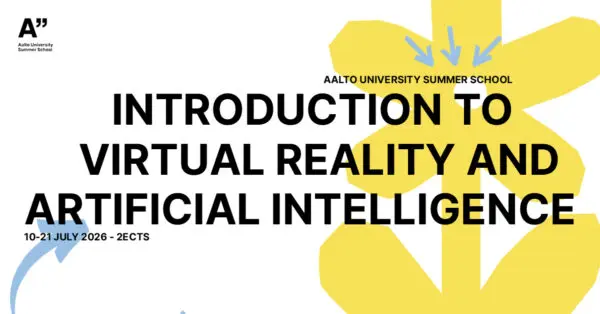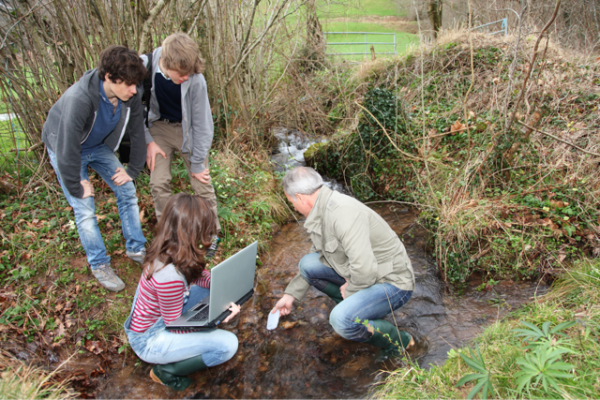
Helsinki, Finland
Introduction to Virtual Reality and Artificial Intelligence
When:
10 August - 21 August 2026
Credits:
2 EC
Read more
Geo Sciences & Artificial Intelligence Summer Course
When:
22 June - 26 June 2026
School:
University of Pisa Summer School
Institution:
University of Pisa
City:
Country:
Language:
English
Credits:
3 EC
Fee:
500 EUR


A large number of applications that only a few years ago would have been considered impossible to be performed without any sort of human interaction are now autonomously executed by increasingly more powerful machines and sophisticated algorithms. Fed by an enormous quantity of available data, machine learning algorithms can learn, without being explicitly programmed, to solve complex tasks such as speech, face, and object recognition or to play and even defeat the best human players at the ancient game of Go.
Machine-learning is becoming an essential skill in many data-intensive scientific fields, including Earth Sciences related disciplines. In may fields of Geosciences datasets are growing in size and variety at an exceptionally fast rate, highlighting the need for new data processing and assimilation techniques that are able to exploit the information deriving from this data explosion. Machine-learning and Deep-Learning techniques have the potential to push forward the state of the art of data analysis procedures used in different fields of the Geosciences. In this context, we propose a Summer School that focuses on the use of Machine Learning and Deep-Learning techniques to geophysical, geological, environmental and geographical data.
Participants will gain hands-on experience by applying each method to real-world geoscience datasets. Case studies will cover a wide range of data types — from hydrological records and rock physics measurements to well logs data, seismic waveforms, satellite imagery, and environmental monitoring data. Through these practical exercises, attendees will learn how to extract meaningful patterns, build predictive models, and tackle pressing challenges in Earth and environmental sciences.
Structure of the program:
INTRODUCTION
- Overview of the course and main concepts in machine learning
- Key steps in a typical ML workflow: data preprocessing, feature engineering, model training, evaluation, and validation. Optimization algorithms.
CONVENTIONAL MACHINE LEARNING
- Supervised Learning
- Regression: linear and non-linear methods and model performance evaluation
- Classification: logistic regression, k-nearest neighbors, support vector machines and score metrics
UNSUPERVISED LEARNING
- Clustering: k-means, hierarchical clustering, DBSCAN, and their role in data exploration and anomaly detection.
- Dimensionality reduction: Principal Component Analysis (PCA) and Independent Component Analysis (ICA) for simplifying complex datasets while preserving key information
DEEP LEARNING
- Fundamentals of artificial neural networks: activation functions, back-propagation, and strategies to prevent overfitting.
- Feed-forward architectures: the multi-layer perceptron and its use for regression and classification tasks.
- Convolutional neural networks (CNNs): architectures, feature extraction, and applications to image classification, pattern recognition.
- Recurrent neural networks (RNNs): sequential models for time-series data, with focus on Long Short-Term Memory (LSTM) architectures;
APPLICATIONS IN GEOSCIENCE
TO BE CONFIRMED:
Participation as teachers of two NVIDIA Engineers that will introduce the following topics:
- Physics-Informed Neural Networks (PINNs)
- Neural Operators (NOs)
- Graph Neural Networks (GNNs)
- Generative Adversarial Networks (GANs)
- Foundation Models (FMs)
The Summer School will be activated with at least 10 students. The maximum number of participants is set to 25 students.
The Summer School will be held on campus, in Pisa, at Dipartimento di Scienze della Terra, via Santa Maria, 53.
The program will be activated also in distance learning mode (TEAMS platform)
Prof. Francesco Grigoli
Graduate Students, Early-Stage Researchers, Professionals
This Summer School aim to provide an overview of the main Machine Learning and Deep Learning methods and their application to geophysical, geological, environmental and geographical data, keeping a more practical flavour.
After the course the student will be able to use basic machine learning techniques applied to geosciences and related fields. The student will learn to identify which method is more suitable than others for the analysis of a particular datasets and to evaluate the performance of the used models.
After the course the student will also have an overview of the main Machine Learning and Deep Learning libraries (in particular SciKit-Learn, Tensorflow and Keras)
Fee
500 EUR, tuition fees
When:
22 June - 26 June 2026
School:
University of Pisa Summer School
Institution:
University of Pisa
Language:
English
Credits:
3 EC

Helsinki, Finland
When:
10 August - 21 August 2026
Credits:
2 EC
Read more

Nijmegen, Netherlands
When:
22 June - 26 June 2026
Credits:
2 EC
Read more

Brussels, Belgium
When:
26 May - 30 May 2026
Credits:
0 EC
Read more